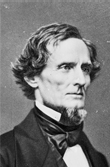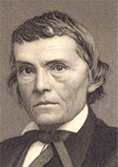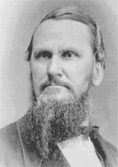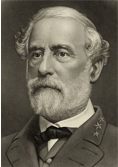Confederate Truths: Documents of the Confederate & Neo-Confederate Tradition from 1787 to the Present.








"Confederate Veteran" Editor S.A. Cunningham editorial "White People and Negroes."
Confederate Veteran, S.A. Cunningham, Vol. 13 No. 9, September 1905, pages 421-2, including an article by James F. Fowlkes from which the Confederate Veterans publishes excerpts.
WHITE PEOPLE AND NEGROES
The VETERAN for September has much about the "old-time darkies." "There ought to be a lesson in it for young negroes. Their aspirations for social equality will ever be their calamity. If they will observe the situation as it really exists, they will see that not an old-time negro lives in the South to-day faithful to white people who has not among them sustaining friends. Devotion between them and those whose slaves they were is steadfast. It will continue until the last white-haired "Uncle" or "Auntie" is laid away, often in the family lot, by those they served in their youth.
The younger generation sees this condition and should profit by it. Northern people cannot comprehend it, and they are at grievous fault, maybe unwittingly, for having done so much to cause it. Those who yield graciously to the inevitable—such, for instance, as specified places in the street cars of Tennessee—will soon find that the kindliest sentiment of white people will manifest itself.
Successful negroes, however much wealth they may accumulate, will find that most indigent whites, who are fitly mentioned as "poor white trash," will no more defer to them than did white masters to their slaves. This line of demarcation is of healthy moral character. The only solution of this matter is for negroes to accept the situation, treat the whites with deference, and they, will soon realize the best they need ever hope to exist between the races.
A paper following this is from a source they should respect. Let white and black, North and South, read it.
A REPUBLICAN ON THE RACE PROBLEM.
James F. Fowlkes, of Tennessee (Waverly), who has been prominent in the politics of his State as a Republican, has written to the Springfeld (Mass.) Republican upon the race question. Brief extracts are taken from the paper:
"Every individual and every section of every country is wise upon some question and ignorant upon others. It reminds us of the college professor who, having a barefoot country lad to row him across the river, was quizzing the boy about his knowledge and was telling him how much of his life he had lost by not understanding geometry, astronomy, etc., when the boat struck a snag and upset; and as the professor came to the top he yelled to the boy, 'Save me, I can't swim!' and the boy yelled back, 'Yer oughter l'arned how to swim; yer's lost all yer life by not knowin' how.'
"It is the follow who rubs against a problem that learns it. While the New England States have been studying astronomy and the higher branches of science, the Southern people have been learning to swim muddy waters of practical and confronting problems. …
"Tennessee, Alabama, the Carolinas, Mississippi, Louisiana, and every other Southern State invite Massachusetts to come and open her court and take evidence and watch the demeanor of witnesses and weigh the proof, and take into consideration, if she will, the environments of racial prejudices, if she finds them to exist, and render her verdict as she would have other States do to her under similar conditions.
"The South, a people who are proud, brave, and. haughty, has passed through the period of subjugation and humiliation that tasted deep and strong of the nasty realities of human affairs practiced in inhuman ways by the members of a like and kindred race—blood of blood and bone of bone. There is no intelligent voice in the South to censure or condemn the negro for what he has done or failed to do, but every cultured heart opens wide its portals of sympathy for the race in the past and with a bleeding interest in its future. The North after the war lived in an atmosphere of cold, abstract, imaginary philanthropy, while the South was grappling with the stern realities. The North stood as the crowned victor of prosperity, while the South stood in the pauperism of desolation and defeat, worn to a frazzle, foot-tired, and bleeding. She surrendered upon terms of honor and carne back into the Union upon terms of equality and as a part and parcel of a common country. Did the North keep her terms of victory in good faith in her subjugation and humiliation of the brave and spirited people of the South to the savage wantonness of a slavish race?
"The strife is past and gone, and the son of the South who can stand upon her soil without pride and fidelity to her sincerity, courage, bravery, and endurance is unworthy the respect of a brave and an honorable North. The race question should be stripped of all sectionalism, sentimentality, bias, race selfishness or prejudice, and considered in all its phases by the deep thinking people of both races . . . . Are the races equal? and if not, can the law make them equal? Does not a forced equality of inequalities produce a greater inequality?
"There is no power on earth except an overpowering military domination that can subject the white to negro rule. The charity of State and race socialism produces dependence, not independence; it produces idleness, not energy; immorality, not morality; the source of crime, not its prevention. The upward climb of every race must be the result of the stern, real, innate stuff within that race. Life in all its phases, among all the races, and in all the animal world is but a war of opposing forces. You may seize the depending power and hold it; you may lift it; you may feel it with the hand of sustenance; but when your strength is called to another source, the rapidity of the fall will depend upon the distance you have carried it.
"The purse of the North has been opened with magnanimous liberality to the negro race and with the very best of motives and desires. A poverty-stricken South, made desolate by war, repudiated her debts to raise taxes that she might give it as a charity to the colored race of the South. [The "repudiated debt" was largely created by carpetbaggers.—Ed. Vet.) The white people of the South, without sympathy and without help, depopulated and maimed, have struggled from the ashes of burned homes and ruined fortunes, carrying each step upon their back the colored people until to-day it stands upon its feet in the possession of a vigorous manhood worth more than all the slaves of all the past, and it is the product of struggle, not charity. The overprejudice of the white in some localities and the overzealous in the negro race may think and say that the white people of the South have ridden back to the station of prosperity upon the backs of the black race; but this could not have been, for the negro had nothing to give in worldly goods, in counsel, or in culture. The negro race succeeding the war did his part in the field of labor with a fidelity that is seldom found. We know of no writer upon ethnological economy but admits that the negro race possesses only about one-half the economic force of the white race, and from an economic standpoint is more a hindrance than a help. The cultured, thinking white people (if the North will give us credit of having such) in the South have no ill desires for or animosities toward the negro, but crave that which is the very best for his future welfare.
"Let Congress provide an ethnological and political economic commission, free from partisan taint, to thoroughly investigate and examine into all the economic bearings of the races and causes and effects of conditions, and, if need be, give it two years or longer in which to obtain data and information. This could do neither race any harm, and any member of any political party could consistently be its author, but more appropriate from a Republican, for he would more likely be free from the charge of prejudice. The Federal supreme court should be free from party influence, and it might be well for it, under authority, to appoint such a commission."